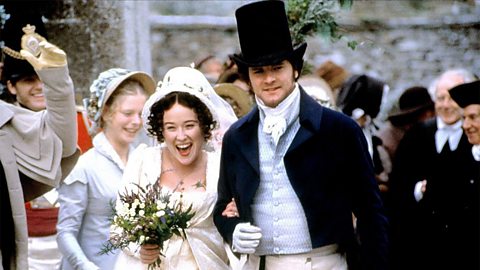What is Pride and Prejudice about?
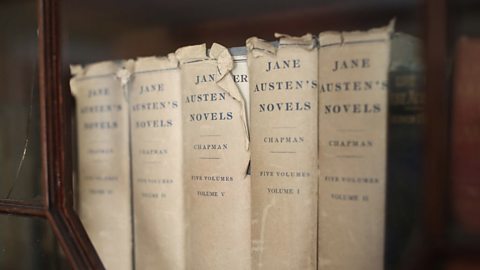
Pride and Prejudice by Jane Austen is a novel about the lives of wealthy people who live in the English countryside in the early 19th century.
It was first published in 1813 meaning it was written and set in the Georgian eraThe time period from 1714 to 1837, during which Britain was ruled back-to-back by four kings all named George..
In the novel, Mrs Bennet is looking for husbands for her five daughters. Most of the story centres around the intelligent and outspoken Elizabeth Bennet and a rich, handsome landowner called Mr Darcy.


МэМэМэМэМэ
Remember
Jane Austen was born into a wealthy family, just like the Bennet family.
She was inspired by the characters and events that happened in her life, but this novel is still fictional.
Pride and Prejudice plot overview
This timeline shows 10 key moments from Jane Austen's novel Pride and Prejudice.
Question
Jane Austen chooses to use a mixture of real and fictional locations in the novel. Why do you think she does this?
Answer
The real locations such as Derbyshire and Hertfordshire give AustenвҖҷs readers a clear sense of the rural, upper-class world that her characters inhabit. At a time when only the wealthy travelled for social occasions, the reader can appreciate how well-off the characters are by how far they travel.
The fictional locations like Netherfield and Meryton mean that Austen can be flexible with her descriptions of each familyвҖҷs home and the surrounding villages. They also protect Austen from any accusations from her contemporary readers that the characters or situations described are based on real life.
Volume 1

МэМэМэМэМэ
Did you know?
In most editions of Pride and Prejudice, the story is split into three volumesIn this context, a single physical book that makes up a part of one longer novel., with the chapter numbers restarting each time.
This was common in the 19th century and meant that readers could buy individual volumes cheaply and build anticipation for the next volume.
Chapters 1 to 12
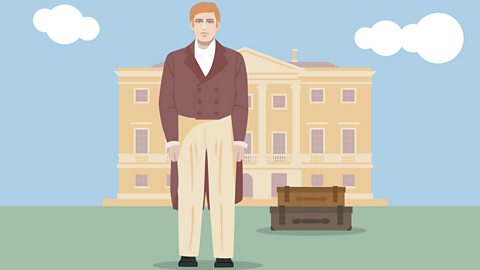
Pride and Prejudice begins with a conversation between Mr and Mrs Bennet вҖ“ a married couple with five daughters. They are part of the landed gentryA social class of landowners. They could live off the money they made renting out their land. and live in a country estateA large house in the countryside, with surrounding land. called Longbourn.
Mrs Bennet is excited by the gossip that a rich, single young man has moved into Netherfield Park (a country estate nearby). The man is called Charles Bingley. She wants Bingley to marry one of their daughters to protect their inheritance, but Mr Bennet is not very interested in the topic.
The Bennet family attend the Meryton ballIn this context, a large formal social event where people dance. . Balls were exclusive events for high society. They were also one of the only places for young men and women to find eligible marriage partners, so they were very important social occasions.
Jane Bennet, the eldest sister, dances with Bingley. Both Jane and Bingley are kind and attractive, and they instantly like each other вҖ“ Jane is the only person that Bingley dances with twice. They meet BingleyвҖҷs sister, Caroline. A friend of BingleyвҖҷs, Mr Darcy, is also at the ball and refuses to dance, commenting rudely about Elizabeth Bennet in particular.
A regimentA large group of soldiers, led by a colonel. of soldiers, led by a man called Colonel Forster, come to stay in the town, which interests the youngest sisters, Kitty and Lydia Bennet. They are вҖңsillyвҖқ and immature, and gossip about the soldiers.
Mrs Bennet encourages Jane to ride on horseback to Netherfield to visit Caroline Bingley, even though it is due to rain heavily. Jane gets caught in the rain and becomes ill so has to stay there overnight. Elizabeth goes to care for Jane, and crosses вҖңfield after fieldвҖқ on her own through mud to get to her.
While at Netherfield, Elizabeth spends more time with Darcy, and they bickerTo argue about things that are not important. with each other. By the time Jane has recovered, Darcy is a little kinder towards Elizabeth, who now вҖңattracted him more than he likedвҖқ. Elizabeth, on the other hand, is вҖңimpatient to get homeвҖқ.

Chapters 13 to 24
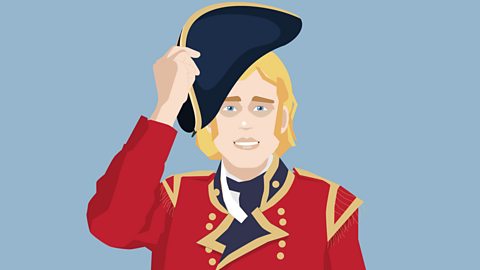
Mr Collins, a distant cousin of Mr Bennet, invites himself to stay at Longbourn. He will inherit/inheritanceTo receive money or property from someone after their death. Mr BennetвҖҷs money after his death because of primogenitureA legal arrangement that means that wealth must be inherited by a son or male relation., a legal arrangement that means his wealth must be inherited by a son. All of Mr BennetвҖҷs children are female and unmarried.
While the Bennets are out walking in Meryton, Kitty and Lydia spot a handsome soldier from the local regiment. They pretend they are looking in a shop window while trying to catch his attention. The soldierвҖҷs friend introduces him as Mr Wickham.
Wickham is charming and is invited to Longbourn to meet the Bennets. He takes an interest in Elizabeth. He tells her that he hates Mr Darcy because Darcy stopped Wickham from receiving an inherit/inheritanceTo receive money or property from someone after their death. that he was owed, which has left Wickham with no money.
Bingley hosts a ball at Netherfield. Elizabeth confronts Darcy about what Wickham told her, but Darcy quickly changes the subject.
Charles and Caroline Bingley have travelled to London. Caroline thinks that DarcyвҖҷs sister, Georgiana, is a better social match for her brother then Jane. So, she sends a letter to Jane suggesting that Bingley and Georgiana are growing close and are expected to marry. Jane is very upset, but Elizabeth suspects that Caroline is lying.
After an earlier discussion with Mrs Bennet, Collins proposes to Elizabeth, who refuses. He then proposes to Elizabeth's friend Charlotte Lucas, who accepts because it is the practical thing to do as she will now be financially secure. Charlotte does not believe it is important to marry for love, which horrifies Elizabeth.

Mini quiz
Volume 2
Chapters 1 to 10
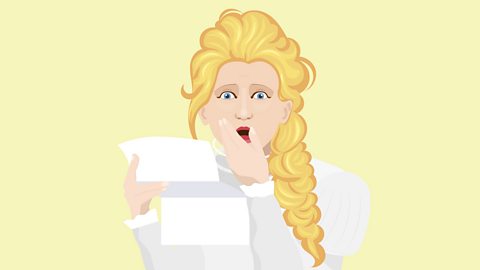
The Bennet girlsвҖҷ aunt and uncle, the Gardiners, visit Longbourn. They see how unhappy Jane is after receiving the letter from Caroline, and offer to take her back to London to stay with them. The Gardiners also warn Elizabeth that Wickham is not suitable for her financially or socially.
Jane goes to London and decides to visit Caroline. Caroline treats Jane rudely as she is trying to keep Jane away from her brother.
Wickham starts to visit Longbourn more often, as he is interested in Elizabeth and Mr Bennet has suggested that he might be a suitable husband for her.
Later, Elizabeth visits the newly-married Charlotte and Mr Collins at Hunsford in Kent. Elizabeth sees that Charlotte does not like to spend much time with her husband: she encourages him to spend time in the garden and ignores his frequent boasts about his wealthy connections. However, Charlotte is described as вҖңcheerfulвҖқ and content with her situation.
Mr and Mrs Collins introduce Elizabeth to DarcyвҖҷs aunt, Lady Catherine de Bourgh, and her daughter Anne. Lady Catherine wants Anne to marry Darcy, and she is surprised by ElizabethвҖҷs willingness to speak her mind.
Elizabeth and Mr and Mrs Collins continue to visit Lady Catherine for dinner at Rosings Park twice a week. Darcy arrives in the area with his cousin Colonel Fitzwilliam. They join the group for their dinners with Lady Catherine.
Darcy also keeps meeting Elizabeth on her walks, as he waits around in expectation of seeing her. They still bicker, but Darcy is making an effort to get to know Elizabeth. Elizabeth is now enjoying his company, but she remains distant towards him because of his previous rudeness.


Chapters 11 to 19
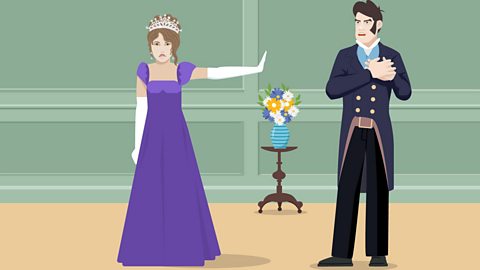
Elizabeth finds out from Colonel Fitzwilliam that Darcy has told Bingley not to marry Jane. Darcy arrives at the Collins home acting nervously. He eventually proposes marriage to Elizabeth, arrogantly saying that вҖңhe had no doubt of a favourable answerвҖқ. Elizabeth refuses and angrily blames him for Wickham's poverty and ruining Jane's chance of marriage to Bingley.
Darcy sends a letter of apology to Elizabeth, explaining that he didnвҖҷt think Jane loved Bingley and that she was only pursuing him for his money. Darcy got this impression from Mrs BennetвҖҷs over-eagerness to set up Jane and Bingley. He also explains that he did support Wickham financially, but that Wickham tried to elope/elopedIn AustenвҖҷs context, to run away and get married in secret. with DarcyвҖҷs sister Georgiana when she was 15 years old, just for her money.
Lydia tries to convince her father to take the family on a summer holiday to Brighton, where the regimentA large group of soldiers, led by a colonel. of soldiers are moving to. Mr Bennet calls her вҖңsillyвҖқ. He says Lydia can go on her own and stay with Colonel Forster and his wife, so that he can have some вҖңpeaceвҖқ at Longbourn.

True or false?
1. Caroline Bingley believes that her brother is in love with Georgiana.
False
Caroline wants her brother to marry Georgiana because she believes that Georgiana is a better social fit for him than Jane. Caroline writes to Jane to try and discourage her from pursuing Bingley.
2. Darcy often visits Lady Catherine.
True
Lady Catherine de Bourgh is DarcyвҖҷs aunt. He is a frequent guest at her home, and visits even more often when he realises that Elizabeth is staying nearby with Collins and Charlotte.
3. Darcy encourages Bingley to marry Jane.
False
Darcy actually tells Bingley that he should not marry Jane. Darcy believes that Jane is only interested in BingleyвҖҷs money because Mrs Bennet has been clumsy and too keen in her attempts to set them up.
Volume 3
Chapters 1 to 10
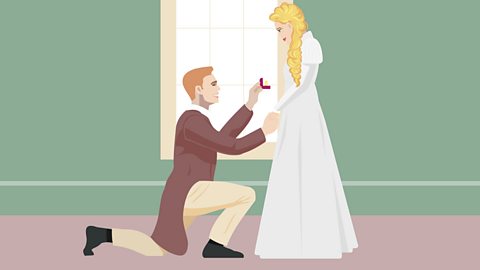
Elizabeth goes on holiday with her aunt and uncle, the Gardiners. They visit DarcyвҖҷs home, Pemberley, in Derbyshire. Darcy is polite and caring, and everyone they meet has good things to say about him.
The Bennet family receive a letter from Colonel Forster saying that Lydia has elope/elopedIn AustenвҖҷs context, to run away and get married in secret. with Wickham. Lydia thinks that they are going to Gretna Green to get married, but they end up in London as Wickham is escaping his debts. Wickham asks the Bennets and the Gardiners for money to marry Lydia.
Lydia and Wickham return to Longbourn. Elizabeth receives a letter from her aunt that reveals that Darcy paid off Wickham's debts and agreed a monetary settlement guaranteeing the marriage to avoid more scandal for the Bennet family.

Chapters 11 to 19
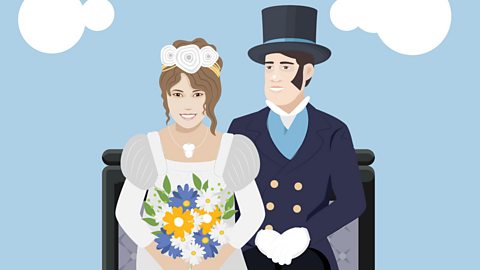
Bingley returns from London and proposes to Jane, who happily accepts.
Lady Catherine visits Longbourn and snobbishly demands that Elizabeth promise not to marry Darcy because she wants her daughter, Anne, to marry him instead. Lady Catherine also believes that her family is of a higher social status than the Bennets. Elizabeth refuses to agree to this, and Lady Catherine speaks to her rudely and angrily before leaving.
Darcy visits Longbourn and goes walking with Elizabeth. Elizabeth thanks Darcy for helping Lydia. Darcy proposes and Elizabeth accepts. The novel ends happily, with a double wedding, as Jane marries Bingley and Elizabeth marries Darcy.

19th century context: elopement
Click through the slideshow to learn more about attitudes towards elopement in the 19th century.
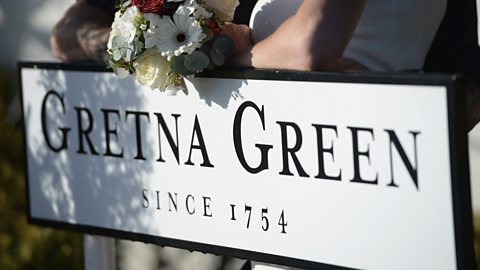
Image caption, An elopement, in AustenвҖҷs context, is when a couple run away secretly in order to get married, usually without parental knowledge. At the time the novel was written, parental permission was needed in England for anyone under 21 years old to get married, and Lydia is just 16. The rules were different in Scotland, and the small village of Gretna Green just over the border from England became a popular place for elopements.
Image caption, When a couple eloped, they sometimes had to travel overnight to reach their wedding location. They would travel alone, which meant that there was the chance of a sexual relationship before marriage. This was seen as dishonourable at the time and a way of harming your reputation, especially as a woman. A pregnancy before marriage would have been disastrous as there would have been no financial support guaranteed to Lydia.
Image caption, In the modern day, the meaning of an elopement has changed. Many couples define an elopement as a small wedding away from home, sometimes in another country. It does not have the negative associations of the Georgian era.
1 of 3
Quiz
Test your understanding of the plot of Pride and Prejudice by taking this quiz.
More on Pride and Prejudice
Find out more by working through a topic
- count2 of 5
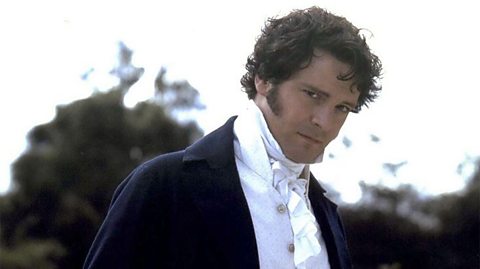
- count3 of 5
